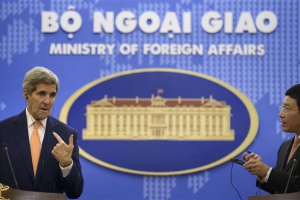An American political analyst in Virginia says the United Sates has a globalist and imperialist foreign policy, while China has an isolationist and xenophobic approach towards foreign policy.
“China and the United States are polar opposite in terms of their foreign policy orientation. The United Sates has a very internationalist, globalist, imperialist approach to foreign policy,” said Keith Preston, chief editor and director of AttacktheSystem.com, a website dedicated to encouraging revolt against domestic and foreign US government policies.
He made the remarks in a phone interview with Press TV on Friday while commenting on US Secretary of State John Kerry’s latest warning to China over its construction of artificial islands in the South China Sea.
Kerry, who was addressing a regional forum of the Association of Southeast Asian Nations (ASEAN) in Kuala Lumpur, Malaysia, on Thursday, accused China of restricting navigation and overflights in the South China Sea, adding that Washington will not accept restrictions on movements in the sea.
“What is interesting about this is that the United States is somehow accusing the Chinese of overstepping its boundaries… because when we compare China’s foreign policy with the foreign policy of the United States, China is a far less aggressive, far less expansionist nation,” Preston said.
The United States has accused China of acting “out of step with both the international rules and norms" after Beijing began work to build artificial islands in the Spratly Islands, a disputed group of more than 750 reefs, islets, atolls, cays and islands in the South China Sea.
China, the Philippines and four other countries have been having disputes over ownership and control of the South China Sea for decades.
“This is a conflict between the foreign policy objectives of the two countries… the United States has a very unilateral, very globalist, very internationalist foreign policy that does reserve the right to intervene anywhere it wants,” Preston stated.
“The Chinese on the other hand have a more isolationist, some people say xenophobic, foreign policy that mostly is concerned about its regional sphere of influence, and protecting its own sovereignty,” he added.
Commenting on the nature of US-Sino ties, Preston said, “The relationship between the United States and China is somewhat symbiotic, in the sense that while there’s no love lost between the two countries, it’s also true that the United States is very heavily dependent on China.”
“First, as a source of financing, its massive fiscal deficits, which are huge; remember that the United States has a $19 trillion national debt; and much of its national debt is financed by Chinese banks, as well as Russian, Japanese and Saudi Arabian banks,” he pointed out.
“Also, American business corporations are very dependent on Chinese labor for manufacturing, and a lot of goods that are sold in American stores are imported from China,” the analyst noted.
“And at the same time, America is China’s primary export market. So the Chinese are also very dependent on the United States as their major export market,” he said.
“So, there is a sort of this interesting symbiotic, economic relationship between the two countries even if they are ostensibly rivals in the South China Sea,” Preston observed.


















